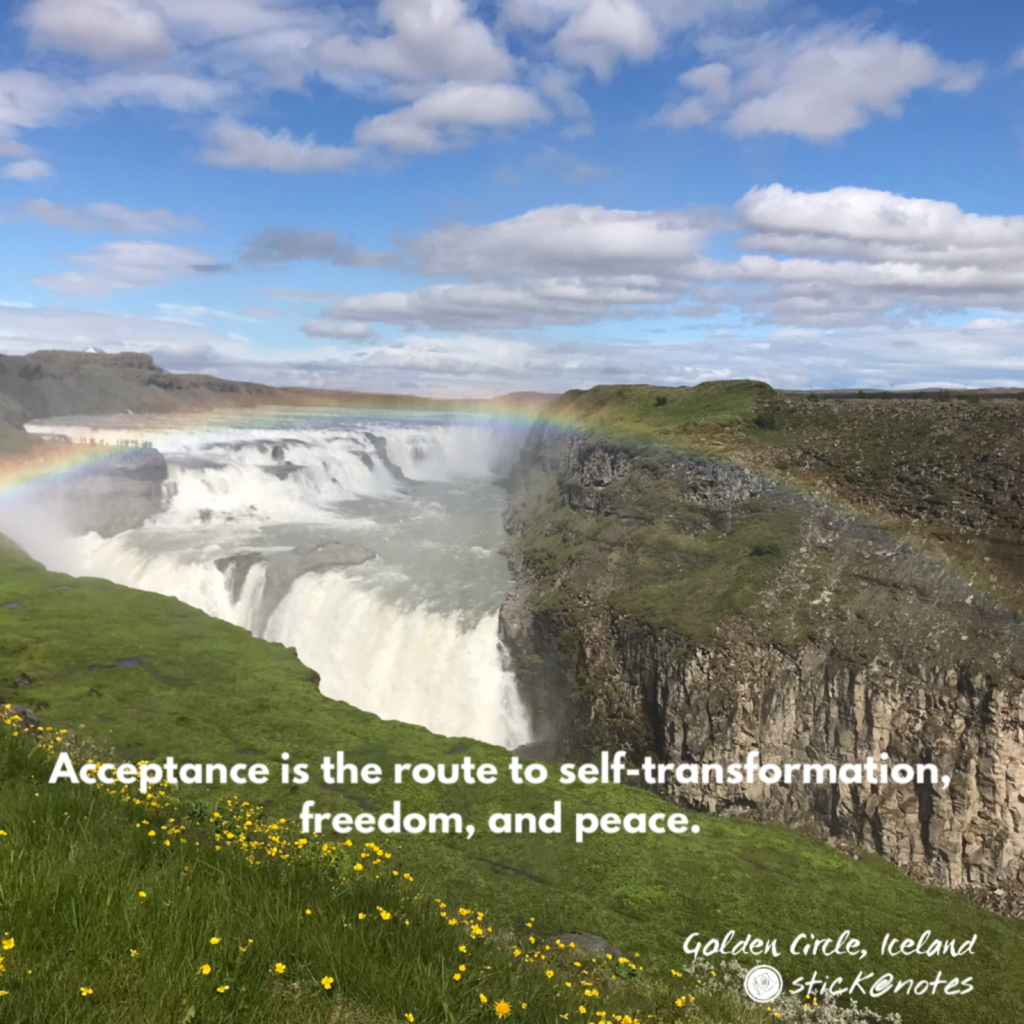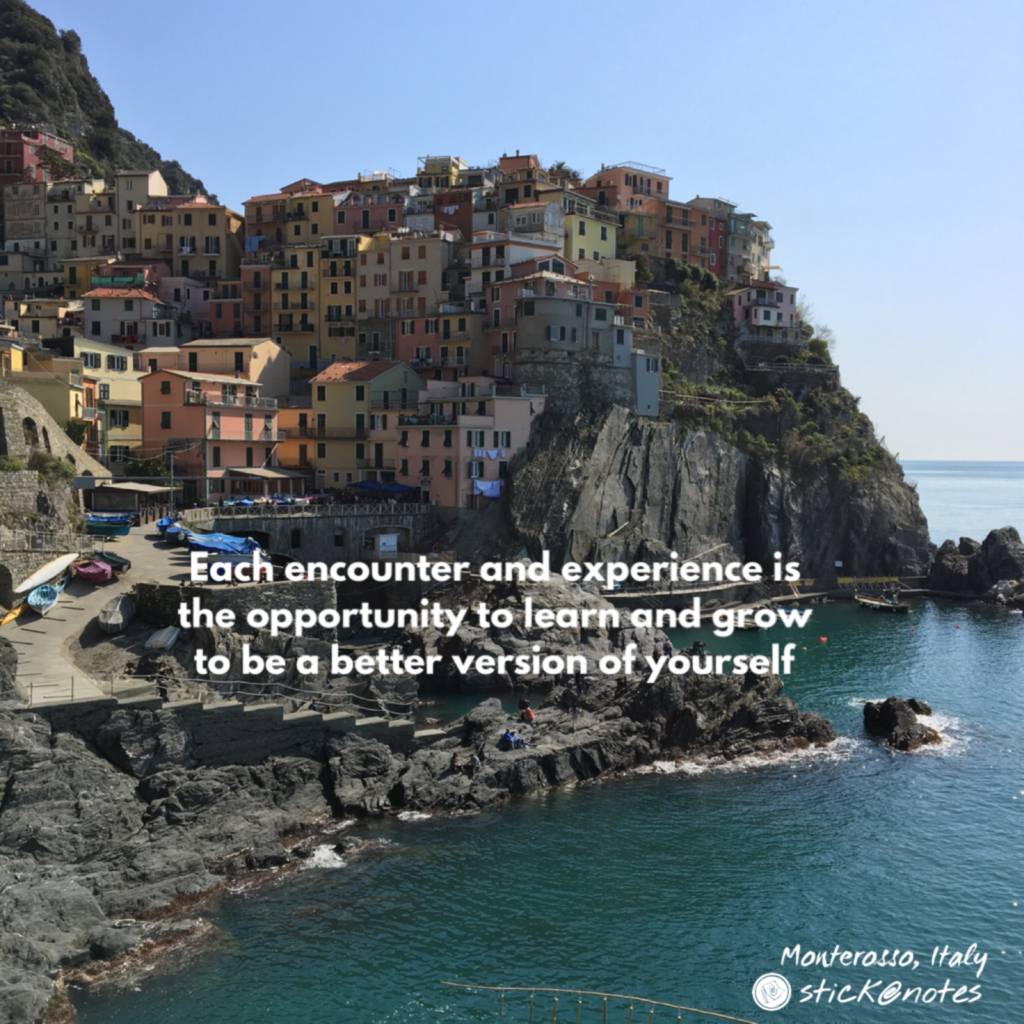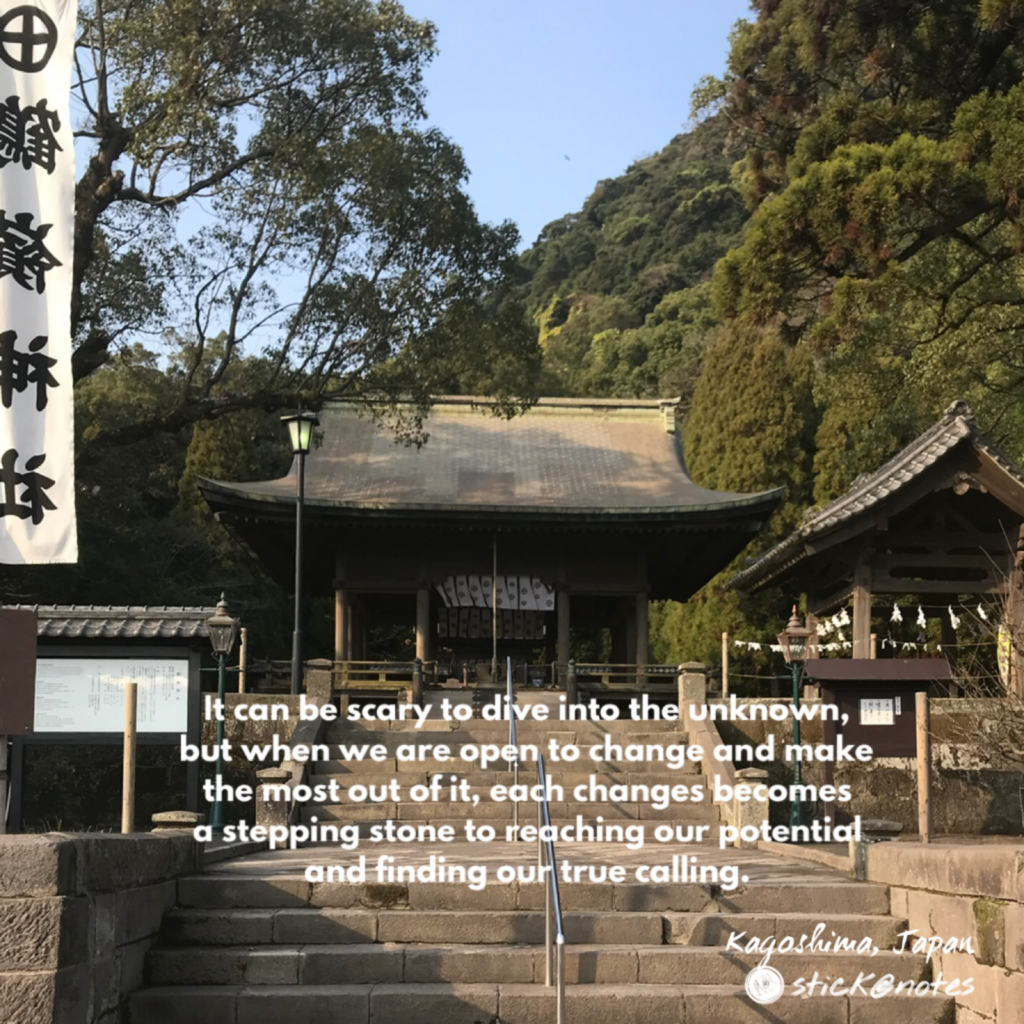-
The Power Of Acceptance
We all have certain desires and expectations; and they give us the motivation and energy to strive and reach our goals. In reality, however, many things in life are beyond our control. And unforeseeable circumstances can happen in a blink of an eye that can shatter our plans. What we desire and expect are not always what we get.
When we talk about the things that are beyond our control; whether it is about our “perceived” self image (that we are born with), where we come from, or unforeseen circumstances; resistance and denials often exacerbate the outcome. It creates frustration, defensiveness, resentment and other negative feeling. Without a doubt, our willingness to accept the uncontrollable have an impact on our emotional wellbeing.
The virtue of acceptance can be intricate in nature. Many misinterpret it as giving up too easily. Practicing acceptance is far from straightforward. It involves awareness, an open mind, patience, and prayers. This is how “Serenity Prayer”, written by the American theologian Reinhold Niebuhr, has helped and guided so many people, including myself, to cultivate better clarity on acceptance during life journey.
God, grant me the serenity to accept the things I cannot change, the courage to change the things I can, and the wisdom to know the difference.
Serenity PrayerSelf-Acceptance
There is always something we dislike about ourselves. We don’t like the image we see in the mirror; and wish we were taller, shorter, skinnier, and so on. We don’t see our own gifts but longing for those talents we see in others.
Some people have a hard time accepting who they are, the past or family status. They live in denials, disguising themselves by acting and pretending to be someone else.
Self-Acceptance is perhaps the most important first step toward self transformation, freedom and peace. When we accept both our strengths and weaknesses, without being defensive, we become more relaxed and content with ourselves. It provides a sense of clarity that, while we are blessed with our gifts, we need to work on our limitations by being open to new ideas, and take each experience as an opportunity to learn.
As a result, people who accept their strengths and weaknesses without resistance tend to have less ego. They naturally exercise other virtues like love and understanding, respect, and humility; all of which can help them do the right things and make the right choices during challenging life events.
Acceptance Of Others
The powerful outcome of self-acceptance is the ability to do the same for other people around us, especially family and friends. The trait of humility through self acceptance allows us to be more compassionate, less judgmental, and accept others’ strengths and limitations with respect.
In some instances, acceptance that involves someone else doesn’t mean that you approve what they do. It simply an act of acknowledgement of who they are; and an understanding that you cannot change others. Acceptance becomes the first step before “you” can make the next move.
You may decide to:
- Accept the problem that hurt you and let go of that someone else (like a manipulative or abusive person), or
- Accept how you feel, what bothers you, and learn to change “within” by practicing patience, respect, adaptability, love and understanding (usually when dealing with family members).
Parents who accept and celebrate each child as unique and special individual, for example, do not compare them with other children; they help their children realizing their strengths and support them through challenges.
Acceptance of Circumstances
While we look forward to certain changes in our life; like moving from high school to college, or getting that first job; some unforeseen changes can cause a lot of stress and turbulence. The secret to making the most out of change is that, first we must acknowledge and accept the circumstances presented before us with open arms. Once we accept, we tend to be calmer and have better clarity to approach the situations. Acceptance can free us from resistance, denials, worries and the urge to change the uncontrollable – the reason causing so many people feeling emotionally exhausted and frustrated.
Practice Acceptance
Just like many other virtues, learning acceptance is a lifelong process. With a clear understanding about acceptance and its impact on our emotional and psychological wellbeing, we react to life experience more consciously; and no longer waste our energy on resistance or denial. Most importantly, practicing this virtue opens up opportunities to exercise other virtues; such as humility, patience, respect, awareness, compassion, adaptability, love and understanding, to name a few. Acceptance is the ultimate route to self transformation, freedom, and peace.

-
Learning From Each Experience
Each one of us is wired to feel uncomfortable in a situation where we “perceive” as negative. And we tend to blame others, the past, or circumstances. We become easily annoyed and find excuses for any problems.
The longer this process repeats day after day, the more complex the problems we create within ourselves. In the end, nothing seems to go our way; everything seems wrong, and the accumulation of excuses, blames and negative feelings eventually catch up to us. We become extremely stressed out, anxious, depressed, and unhealthy.
The good news is, we are equipped with this amazing tool that is so called “feeling”. When we choose to be aware, our feeling functions like a “sensor” or cues. Notice when this sensor detects negative emotions such as anger, sadness, disappointment, or worries; and acknowledge it.
Before we let this negative feelings transition to hundreds of negative thoughts, practice asking this question: what do I have to learn from this experience? Do I need to take some actions or practice acceptance and changing from within?
To answer this question, first we need to classify if the circumstances we are facing is within or beyond our control.
I feel terrible, can I do something and change the situations?
If the answer is yes, by no means take some actions and do our best to change the things we can for the better. For example, you failed your exam because you were partying instead of studying the night before the exam; and you feel terrible about it. In this case, you learn that you have total control of the situations, need to take responsibility and work harder to be successful in anything you do.
What if I feel awful and can’t change the situations?
More often, however, you can’t really do anything about certain circumstances such as unforeseen change in life; nor others’ behavior, because they are just beyond your control.
You can’t really change a driver who cut in front of your car, nor your colleague who is always angry. Instead of letting negative emotions consume you, adjust how you react to those circumstances that are beyond your control. You may learn to be more patient, adaptable, or accepting. You may also learn why letting go is the key to a happier you.
We can learn various things in many different ways, but life experience is one of the best teacher if we allow it to be. By letting our feeling as compass to happiness, each encounter and experience is the opportunity to learn and grow to be a better version of ourselves.

-
Making The Most Out Of Change
Early last year, my son decided to quit his job and abruptly moved across the country to pursue another college degree. He faced various changes in circumstances which prevented him to settle permanently in one place until eight months after the move. Then coronavirus pandemic hit, and colleges around the country closed their campuses and moved classes online. Like most students, he has to move back home temporarily until campuses re-open.
If he has to summarize his past year in seven words, he can use the popular quote by Heraclitus; “Change is the only constant in life!”
He is definitely not alone feeling the frustration of constant change, especially during the current pandemic! But changes, big and small, are very much a part of life affecting us all. No one is immune to it, and avoiding change is just another way to create more stress in life.
Our ability to overcome hurdles and obstacles really depend upon how we react to them. Instead of resisting changes that come along our life journey, there are four ways to embrace and make the most out of them.
1. Change is an opportunity to learn something new (hard skills)
During this pandemic, with stay-at-home order and restrictions to dining at the restaurants, many are adapting to home cooking and baking more than ever. Social media are flooded with recipes and cooking videos. Many who hardly cook before find a new hobby to enjoy. Some learn to be more creative. Others even turn it to a home-cooked meal business.
At workplaces, employees’ resistance to change is one of the challenges faced by managers or supervisors; costing companies significant lost time and productivity. When they implement software or culture change, for instance, employees who are adaptable and show willingness to learn are the ones who excel in their career; compared to their peers who resist and complain about the change.
2. Change is an opportunity to sharpen soft skills
Soft skills, also known as interpersonal skills, are combinations of personal attributes and traits that often determine how well we interact with others. Unlike hard skills that can be learned at school or through training, soft skills relate to emotional intelligence developed naturally or learned through awareness from life experience. The changes we encounter throughout our life are in fact life experiences we can use to sharpen our soft skills. These include but not limited to adaptability, patience, communication, flexibility, creativity, leadership, teamwork, and time management.
3. Change is an opportunity to re-assess current situation
During the current pandemic, businesses suffer and unemployment skyrockets. This can be an opportunity for us to re-assess our emergency plan, as well as budgeting and spending habits. We may save extra money unsubscribing the unnecessary or reduce dining out. We can also plan for a more robust emergency fund to better prepare in the future.
4. Change is an opportunity to step outside our comfort zone
We all like familiarity and security. Staying in our comfort zone keeps us comfortable, safe, and to some degree free from anxiety. But stepping out of our comfort zone is one way to experience and try new things, grow and reach our potential.
To illustrate this, let’s look at this scenario. You have been working for one company for more than 10 years. You feel comfortable, know everyone, and do your tasks so well that practically you can do them with one eye closed. There is no challenge, and you have learned everything you need to. Though sometimes you feel bored and unproductive, you are reluctant to change job due to fear of the unknown.
One day the company has to downsize and you lose your job. This change may seem overwhelming at first; but it is your chance to step outside your comfort zone, and look for another job. You can even explore other opportunities like freelancing or starting a business. There is no doubt that this change requires courage; after all you are stepping into unfamiliar zones. Later when you look back, you realize that the whole experience allowed you to expand your horizon and cultivate a successful career.
It can be scary to dive into the unknown; but when we are open to change, and accept them with open arms, we can make the most out of it. Each changes can become a stepping stone to reaching our potential and finding our true calling. It is common that we hear many successful and happy people find their purpose in life, and end up doing something they’ve never thought they could, after a life changing event.

-
Doing The Right Thing
Have you ever worked so hard to impress your boss, only to find that he/she dismissed what you did. And even criticized you for spending too much time on low priority job?
It certainly is upsetting when we choose to work hard to make ourselves look good, and not getting the responses we expect. Likewise, it is difficult to make choices when we are presented with two opposite forces.
There is nothing wrong when we occasionally expect acknowledgment or appreciation as an incentive to do better. Making choices due to fear of missing out (FOMO) or to gain others’ approval, however, often lead to stress and disappointment.
Everything we do in life is a choice. Those choices determine the kind of life that we are going to live. As a result, it is important to make good choices that are aligned with our values and life purpose. In other words, instead of doing something to follow the crowd, we should make choices that feel good, and feel right.
How do we know if we do the right thing?
Our conscience often guides us to know the difference between right and wrong. Doing the right thing also goes hand in hand with being true to our ethical values and principles.
To illustrate this, let’s look at a couple of examples. Let’s say your highest value is spending time with your family. Your boss offer you a promotion with good money but you have to be away from your family for extended period of time. You may crave for a better pay but you know that the money at this point is not worth going against your value, and doing the right thing is to say no to that offer.
Likewise, when you put transparency as one of your principles, you may find it stressful working for a company that has a culture of keeping employees in the dark. You can do the right thing proposing and strategizing more transparent communications, or move to another company that shares similar values.
Life is about making choices. Use your gifts, do your part, do the right thing, and don’t worry what everyone else is doing. And you will uncover the ability to make good choices in all aspects of life.

